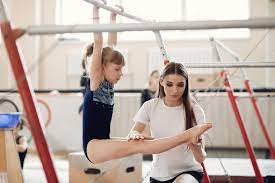Confidence isn’t something children are born with—it’s something they build, step by step. And one of the most effective and engaging ways to help kids grow their confidence is through gymnastics for kids. More than just cartwheels and balance beams, gymnastics offers structure, progress, encouragement, and community—all key ingredients in nurturing a confident young mind.
From their first forward roll to nailing a handstand, every milestone in gymnastics teaches kids to believe in themselves and celebrate their progress.
How does gymnastics help kids develop confidence?
Gymnastics for kids is designed to promote incremental skill-building in a safe, supportive environment. Each small achievement reinforces a child’s belief in their abilities, while the nature of the sport encourages persistence and self-discipline.
Here’s how confidence is naturally cultivated in a gymnastics setting:
- Goal setting and achievement: Children set clear, achievable goals (like learning a cartwheel) and work toward them through consistent practice.
- Progress tracking: Coaches often use visual tools and structured levels, helping kids see how far they’ve come.
- Positive reinforcement: Small wins are celebrated, creating an atmosphere where effort is valued as much as outcomes.
- Peer encouragement: Seeing others succeed fosters a culture of mutual support and helps children understand that mistakes are part of learning.
What role do coaches play in building self-esteem?
Coaches are often the unsung heroes in the development of children’s self-belief. A good gymnastics coach uses encouragement, not pressure, to inspire growth. They recognise individual effort, give constructive feedback, and model resilience—especially when a child struggles.
Children begin to internalise these cues. They learn that setbacks don’t define them, and that improvement is possible with effort. This promotes a “growth mindset,” which psychologists widely agree is crucial for lifelong confidence.
Does gymnastics help shy or introverted children?
Absolutely. Many shy or quiet children thrive in gymnastics because the structure allows for gradual participation. Unlike team sports where constant communication is required, gymnastics allows children to focus on personal goals while still being part of a supportive group.
Here’s how gymnastics can help socially reserved children:
- Non-verbal achievement: Success is shown through movement, not words.
- Encouraging environment: Group cheers and shared milestones help reduce social anxiety.
- Routine and predictability: The consistent class structure offers security, helping children feel comfortable over time.
What happens when children overcome fear in gymnastics?
Learning to trust your body—and your coach—builds a type of emotional resilience that directly translates to self-assurance. Whether it’s trying the uneven bars for the first time or jumping into a foam pit, gymnastics challenges kids to confront fear in a controlled and encouraging space.
Overcoming physical fear can lead to:
- Improved risk assessment skills – Kids learn to distinguish between healthy challenges and unsafe decisions.
- Self-trust – The realisation that “I can do this” after trying multiple times is a game-changer.
- Greater independence – As children succeed without constant adult assistance, they become more willing to try new things on their own.
How does group training enhance social confidence?
Gymnastics classes often involve group warm-ups, partner activities, and rotation stations. These shared experiences give children the chance to work collaboratively, cheer each other on, and handle minor setbacks in a team setting.
The social benefits include:
- Making friends with shared interests
- Learning to take turns and follow instructions
- Developing empathy by watching others overcome challenges
This “together but individual” setup is ideal for promoting social development without the performance pressure of team-based competition.
How can parents support confidence-building outside the gym?
Support doesn’t end when class is over. Parents play a crucial role in reinforcing confidence by focusing on effort rather than perfection.
Helpful ways parents can boost their child’s self-belief include:
- Asking, “What was something you tried hard at today?” instead of “Did you win?”
- Encouraging reflection on progress rather than comparison with others
- Displaying their child’s ribbons or achievement certificates at home
- Watching and applauding practice—even the wobbly bits
When praise is genuine and focused on growth, it strengthens internal confidence rather than creating a reliance on external validation.
Why is gymnastics a long-term confidence booster?
Unlike short-term boosts from praise or prizes, the confidence gained through gymnastics is rooted in real experience. It’s a confidence that says, “I’ve done something difficult before, and I can do it again.”
Gymnastics lays the groundwork for:
- Perseverance
- Resilience
- Body awareness
- Self-discipline
These qualities go far beyond the sport. They support children in school, friendships, and later in life as adults navigating new challenges.
FAQ
Is gymnastics for kids suitable for all fitness levels?
Yes. Most gymnastics programs offer different levels and progressions so kids can start at any fitness level. Coaches modify exercises to ensure each child feels challenged but not overwhelmed.
At what age can children start gymnastics?
Children can begin as young as 18 months in parent-assisted classes, while more structured classes typically begin from 4 or 5 years old.
What if my child lacks confidence to try gymnastics?
Start with a casual trial class. Many gyms offer “come and try” sessions that allow children to explore the equipment at their own pace. Seeing others their age having fun often builds the courage to join in.
Final Thoughts
Confidence is like a muscle—it grows when exercised regularly in the right environment. Gymnastics for kids provides that environment: structured, supportive, and focused on personal progress. Whether your child dreams of competing or just wants to have fun while moving, the benefits will last well beyond the gym floor.
If your child is just getting started, beginner gymnastics classes are a great way to build skills and confidence from day one.
For further reading on the link between sport and childhood confidence, visit this article from the Australian Sports Commission.

